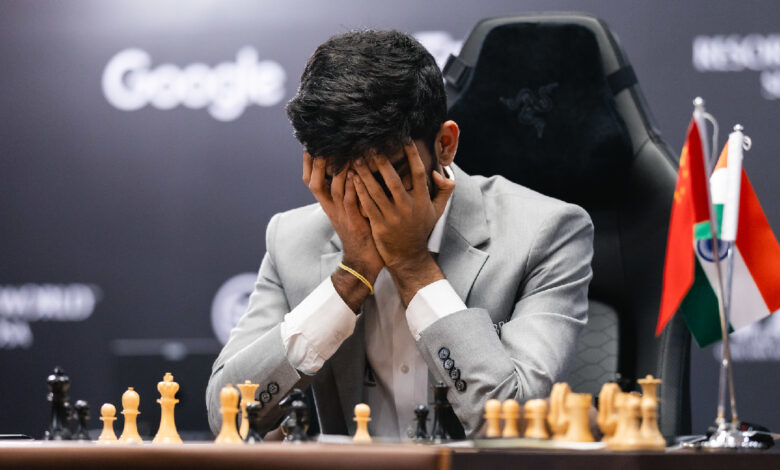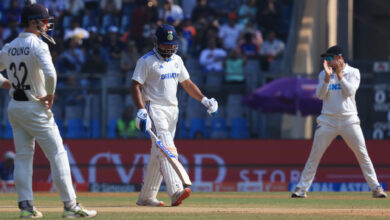How Ding Liren shocked Gukesh in Game 1

World Chess Championship: D Gukesh planted his face in his palms, unable to come to terms with how quickly the momentum had shifted in the first game of the World Chess Championship against Ding Liren. Game 1 of the World Chess Championship began with promise. The 18-year-old had swaggered into the playing arena — nicknamed the fishtank, a sound-proof room with mirrored glass that prevented the players from looking outside or hearing noises from outside — exuding the confidence of youth. In the first few moves, he established himself in control. But the day ended with a desperate dash to evade losing on time and then a resignation with white pieces in 42 moves.
Ding Liren, a man who has experienced the anxiety of playing in a World Chess Championship, tried to catch him off-guard with black pieces in the opening employing the French Defence. It was a Hail Mary of sorts, coming too early into a World Chess Championship.
Ding Liren takes on Gukesh in the first game of the World Chess Championship. The players were playing in a sound-proof room with mirrored glass that prevented the players from looking outside or hearing noises from outside. (Photo: FIDE Flickr via Eng Chin An)
But Ding had his reasons. “Because it was his first game, I was thinking he might get nervous at the start. So I tried to play something unusual which I haven’t in a long time,” Ding revealed. The last time the Chinese GM had used the French Defence, it was against Ian Nepomniachtchi, where he had lost.
How Gukesh vs Ding Liren played out in Game 1 of the World Chess Championship. (Courtesy: Lichess)
But Gukesh had no trouble dealing with Ding Liren’s ploy. So much so, that he forced Ding to do a double take the seventh move, where the world champion spent 27 minutes thinking. It was an odd time to be forced into a long, hard think, especially when he was the one who had tried to seize the early initiative.
the time Ding made his 7th move, Gukesh had a sizeable advantage on the clock. He had spent under a minute on seven moves. Ding had used up over half an hour. “I obviously surprised him in the opening. I was playing some good chess,” Gukesh later said.
Caution to the wind
On the 10th move, Gukesh threw caution to the wind. His pawn on the g file raced away to g4, abandoning any safe plan to get his own king to cover on the king-side corner. The plan was to put pressure on Ding’s pawn on the e file with a f5 pawn push soon. Ding was already 48 minutes down on the clock this stage.
The first games of the World Chess Championship are meant for tepid draws. It’s an occasion to get a measure of the other player’s current form and confidence. So like pugils in a prize fight, grandmasters are content to throw a few punches just to see what the opponent’s jaw is made out of.
Not Gukesh. He had chosen to walk into the game with his guard down, daring his opponent to throw a haymaker. “This game already looks complicated. A little bit out of control. It’s really too much for a Game 1,” remarked Xie Jun, former women’s world champion from China, who was in Singapore for the event.
Things were about to get more complicated. Gukesh allowed Ding’s knight to plant itself on b2, which would allow it to cause mayhem on his back ranks. On the 21st move, Ding’s queen jumped on d3, right next to Gukesh’s queen, but was protected the knight on b2. At that moment, Gukesh made a significant error, he withdrew his queen to e1, right after falling behind on the clock for the first time in the game.
That move pushed his most powerful piece into a corner. Ding’s pieces started to smell blood in the water of the ‘fishtank’. A rook moved in on an unprotected white knight. A bishop sauntered past Gukesh’s defensive line of pawns. Ding’s pieces were taking positions for a coordinated assault on Gukesh’s king.
the 33rd move, Gukesh was scrambling. He needed to make seven moves in 45 seconds to avoid losing on time. He managed to get his 40th move with one second left on the clock. But he had to resign two moves later anyway because Ding had three additional pawns on the board. The world champion from China leads 1-0 in the best-of-14 contest.
Ding has won exactly three classical games this year, two of those have now come against Gukesh. Both with black pieces.
This is the first time since the 2010 World Chess Championship match that the first game has ended in a result. Gukesh might draw some comfort from that world championship 14 years ago. His mentor, Viswanathan Anand, was the one who had suffered an opening game loss to Veselin Topalov. But Anand had managed to claim the title anyway. Now Gukesh, who has walked into the footsteps of Anand for years, will hope to emulate Anand once again.







